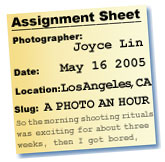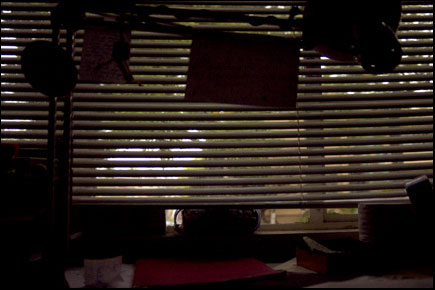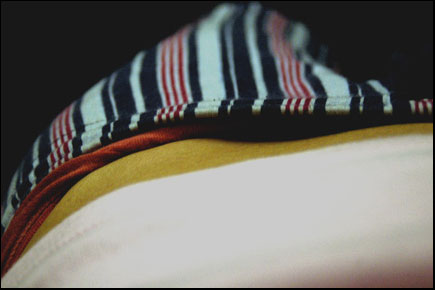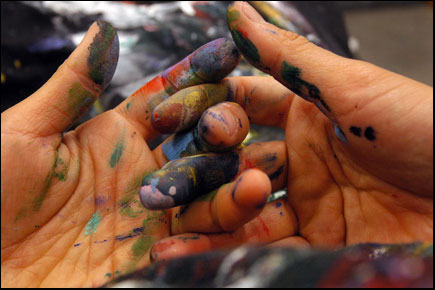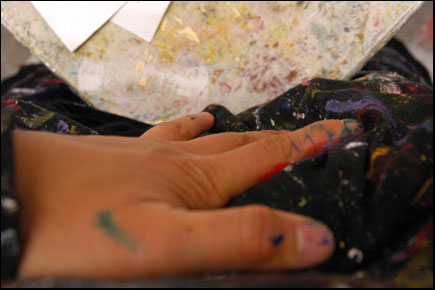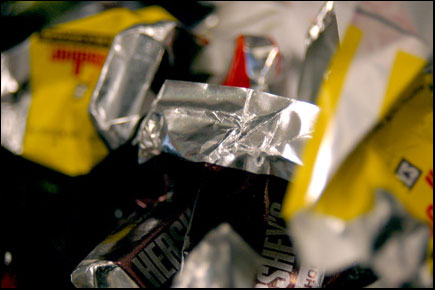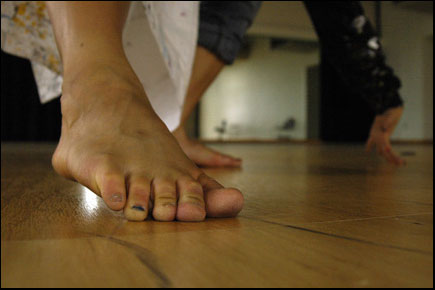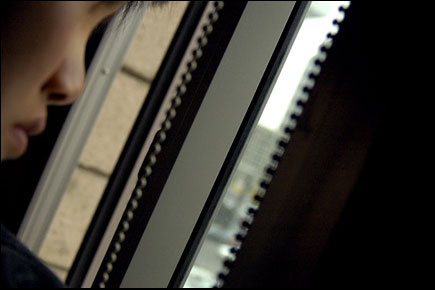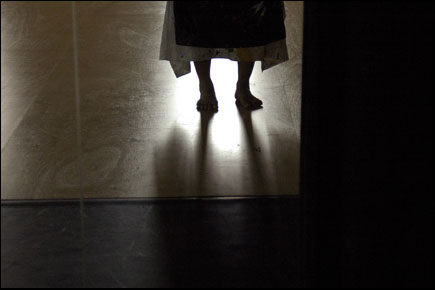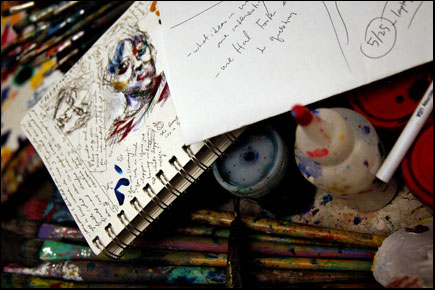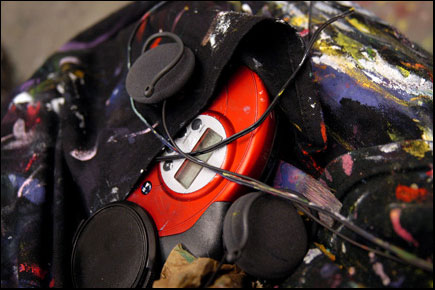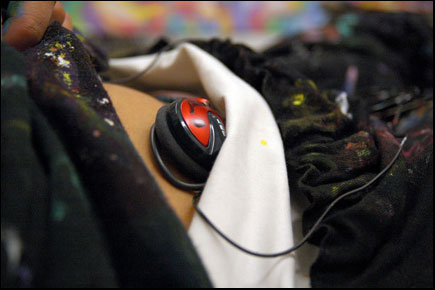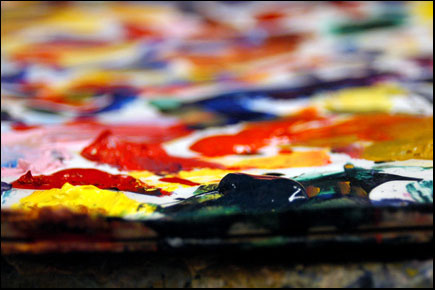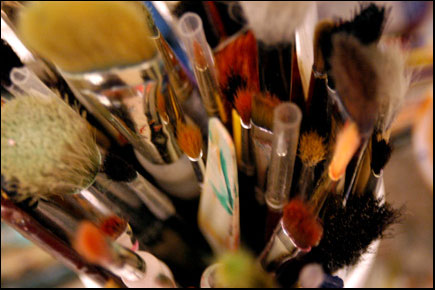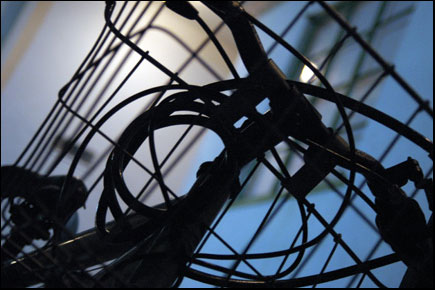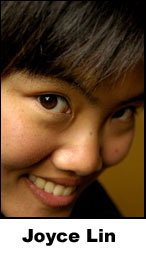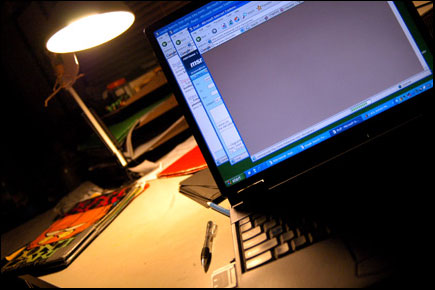by
Joyce Lin
Contributor/ UCLA Daily Bruin/ Los Angeles, CA
So the morning shooting rituals was exciting for about three weeks, then
I got bored, and it just evolved into another ritual: shooting every
waking hour. About a month ago, going on and off (depending upon
schedule and dedication) I started this new ritual, which builds
upon the morning-shooting rituals idea but is potentially even more
obsessive, involving making a photograph every hour that I am awake.
The photographs were meant to be documentary, but become repetitive
after constantly shooting the same subject (my life) over a period
of several days. A problem is shooting in places where it’s
difficult or inappropriate to shoot, such as in a lecture or while
in a meeting. However, shooting under these circumstances pushes
me to get over my own insecurities and self-consciousness as a photographer
while accustoming others to my shooting them. Another challenge is
getting my hourly photo in a situation where one doesn’t notice
the time, such as during painting, going out on a long jog (without
the hefty camera), etc.
The hourly-shooting project is quite exciting; if only I were a better
photographer. A goal is to become so proficient with the camera that
I can lend excitement and visual interest to even the most mundane
of photo-subjects, making every photo-shoot (even the dreaded meeting-photos)
visually popping. But it’s so difficult. David Leeson said
that he challenged himself to go on the most mundane photo-assignments,
because unless one can master shooting the mundane and making it
look good (while being photojournalistically correct and meaningful),
there is no point in going abroad or anywhere else to attempt to
take photographs (in his instance, to go off to shoot war zones).
And now, to rant:
What to do when a sudden flurry of circumstances and battling interests
(each valiantly vying for my limited attention) draws away from my
focus on photojournalism, which I consider as absolutely important
to my life; I must practice, must keep shooting, must do everything…?
Criticism is wonderful; I know that it’s good for me and integral
to my growing into being the best I can be as a photojournalist. However,
after every lecture and/or harsh critique of my work, my heart drops;
I feel both a heightened awareness of my own inadequacy as a photojournalist,
(which makes me want to shoot more), and a crushed discouragement at
my own horribleness that makes me ashamed of my photos, (inducing a craving
for a massive hole for me to climb into, shielding myself from the rays
of light-creating photographs, and forgetting about the dream altogether,
for sometimes, it all feels so truly hopeless).
Sometimes, I consider divorcing my camera. What a thought. But it’s
the wrong idea. The camera established my identity and most of my relationships
in my life; to live without it is unthinkable; nevertheless, having the
camera occasionally constitutes not directly experiencing life; the photographer
experiences life vicariously through others through the camera lens.
The camera may be a passport to all sorts of events, causing people to
act differently, either to smile more, to do ridiculous things, to be
more cautious and alert of doing dumb things, etc. Oh, camera! What a
tool! Sometimes it feels so stupid that I must rely upon it for pleasure
and to live life. Someday however, I hope this tool to provide a living
for me. To make a living out of utilizing the camera to take pictures,
and thus to capture life. Does capturing life entail not living it fully?
Or does making photographs cause one to experience life even more deeply
because one attempts to understand it better and translate it to a visual
language to share with the world? For one does live through the camera,
but only THROUGH the camera, not living truly. Can life be lived without
the camera? It must be… through photojournalism, I’ve learned
so much more about my college and experienced so much more than all of
my non-photojournalist friends. We are truly privileged to be able to
do this. To do this for the rest of my life ought to be amazing. I must
stop questioning and get working.
To truly understand a subject, one must immerse oneself within the subject’s
environment. However, there is always the lingering thought of, “I’m
supposed to be making a photo. So, how’s the light? Any interesting
actions? Expression? Etc.” One isn’t fully immersed in the
environment, because the camera fully occupies at least a portion of,
if not most of, the photographer’s thoughts.
In the summer, I shall be traveling across America for my first ever
paid photojournalism internship. I am both apprehensive (now I shall
truly find out whether or not this is for me! I hope I haven’t
been planning and toiling in vain, only to find that I hate this…)
and excited (I get to get away from my parents and home of 18 years,
do what I love, and figure out my future this summer! Yeeeaah!) It’s
a very teeter-totter sort of situation. And this is my final summer
of college. What madness is this?! How did it all pass by so quickly?!
Life zooms ridiculously quickly.
Joyce Lin
jazamoo@hotmail.com
EDITORS NOTE
I
am adding this commentary and these suggestions with
the permission of the author.
When
I read this journal by Joyce Lin it brought me back
many, many years to the exuberance of my own youth.
When
I received my first adjustable 35mm camera (an Argus
C-3) in my mid-teens, I also felt compelled to burn
lots of film in an effort to find my artistic niche.
While
I never attempted the rigorous discipline described
here by Joyce, I pointed my lens at everything. There
seemed to be so many photographable subjects screaming
for my attention. The cost of film was an issue considering
my meager teenaged allowance. So I bought military
surplus 35mm movie film and loaded used film cassettes
in the
darkness of my closet. Who could have dreamed of the
financial freedom that would occur many years later
in the form of digital photography.
So,
Joyce, please allow me to urge you to burn digital
images and not to be discouraged if the immediate results
seem to be unworthy of your aspirations. Learn from
your mistakes. Analyze every photograph and think of
what you might have done to make it a better picture.
Imagine how that shot might have looked with a different
lens; a different perspective; a lower angle. Perhaps
strong back or side-lighting would have separated the
subject from the background. Play around with different
tools and techniques and remember what works and what
doesn't.
Pay
attention to other photographers' photographs. Do you
see something that you really admire? Pick that shot
apart in your mind and try to get into the artist's
head to see what he/she was striving for. Utilize everything
you like in your own work. BUT, don't just copy someone
else's style. Add your own personal twist to it. Otherwise
you will be guilty of mimicking another artist's talent.
Eventually
you will build up a style of your own and you will
know when that happens.
Your
attention to the words of David Leeson concerning his
willingness to devote extra effort in making good photos
at mundane assignments will pay dividends in your future.
That is possibly the best advice you could ever get.
|
If you
are fortunate enough to be hired as a free-lancer or staff
photographer for a newspaper, you will get your share of what
I have frequently called "headshots and real estate" assignments.
If you maintain an attitude that you will make the best "head
shot" or "building shot" ever made, you will
please your editors and you will please yourself. Don't settle
for the eye level, normal lens, front-lit snapshots. Look around.
Use your head; your eyes; your senses. Let me add; you MUST
come back with a photo that can be used in the paper, and that
might have to be a straight forward shot. But, after making
that "safe" shot, go wild. Be artistic. Don't be
afraid. Do something that you've never done before. Do something
that you've never seen before. Just make certain that you come
back with something that the paper can use. Many Picture Editors
won't understand some of your ideas and many will be afraid
to use something that's out of the ordinary. That's why you
have to have something that they can use. Also, remember the
word RELEVANCE, when making photographs for
newspapers. But, you will please yourself with your diversity
and someday, you might be able to slip a good one through the
door.
|
|
